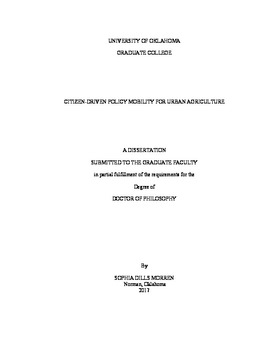| dc.description.abstract | The practice of sharing ideas among cities is almost as old as cities themselves. This relational phenomenon is particularly pronounced when it comes to policies focused on urban development or governance of land use. Often referred to by urban geographers as policy mobility, these practices have sped up over time and space with advances in technology. The practices that urban professionals utilize to diffuse policy ideas are well documented; however, the technologies allowing ‘fast policy transfer,’ primarily the Internet, also make it possible for citizens and activists to engage in policy mobility practices (Peck and Theodore 2001). Although most urban policy mobility research focuses on the activities of urban planners and the business elite, this study explores how the advocacy efforts of everyday citizens relies on knowledge about policies in cities other than their own. More specifically, through case studies I examine how and why citizens utilize policy mobility to advocate for municipal ordinances that enable urban agriculture, with particular emphasis on ordinances regulating chickens at the household scale.
The case studies in this dissertation rely on qualitative research methods including archival inquiry, discourse analysis, in-depth interviews, and participant observation. To situate the project, I offer a brief history of urban geography, locate my research within the field, and summarize scholarship on urban agriculture. The first phase of the project is a comparative case study of three college towns that passed chicken-keeping ordinances: Columbia, Missouri; Knoxville, Tennessee; and Norman, Oklahoma. The second part is an in-depth case study of Oklahoma City, where city council representatives denied residents the right to raise backyard chickens on a typical household lot.
In addition to providing evidence of citizen policy mobility, this project contributes to filling a void in urban geography when it comes to exploring food production at the household scale. Focusing on municipal ordinances that allow chickens on standard-sized residential lots, I found that achieving passage of such policy relies on citizens who push for change, knowledgeable city staff, supportive municipal politicians, and advocates who educate the public about urban agriculture. Yet due to the territorial nature of cities and place-based priorities such as a desire to surmount rural origins in suburban-like neighborhoods or rise above practices associated with marginalized populations, the presence of these qualities does not always result in passage of ordinances friendly to backyard chickens. And even when policies are passed, they do not guarantee the right to food production for all segments of society. | en_US |
